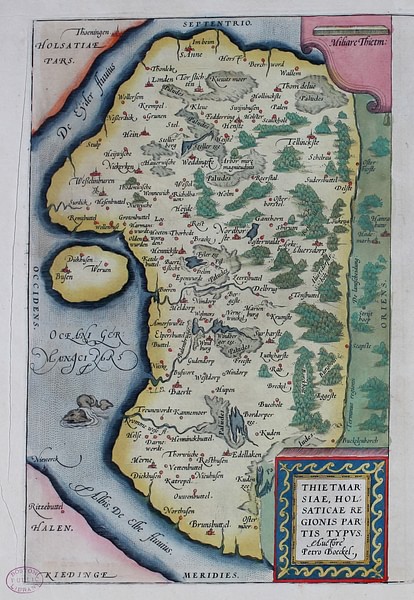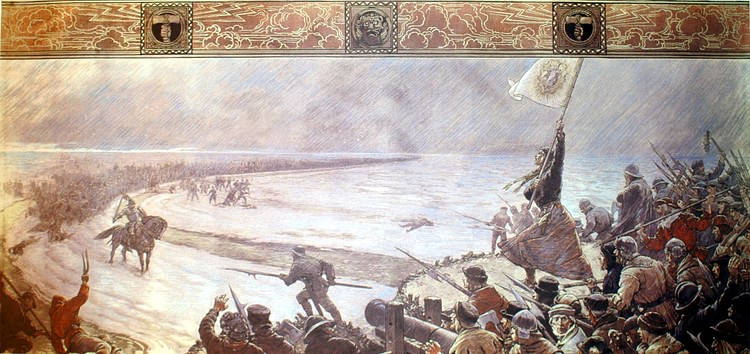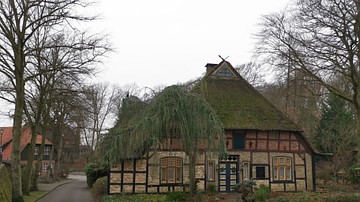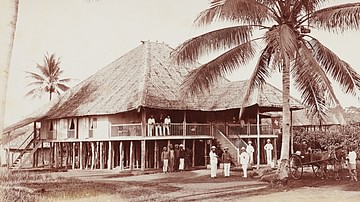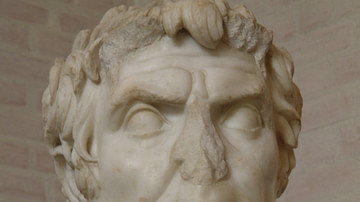Located in what is the present-day German province of Schleswig-Holstein, the Dithmarschen Republic (1227-1559) was a republic by commoners who developed quasi-democratic institutions, including their own written constitution. Fiercely independent and freedom-loving, these peasants successfully defended their political independence against the forces of Holstein and the Scandinavian Kalmar Union as the Middle Ages came to a close.
James Blake Wiener speaks to Dr. William L. Urban, a medievalist and the author of Dithmarschen: A Medieval Peasant Republic, to learn more about the Dithmarschers in this interview.
JBW: Dr. William L. Urban, many thanks for speaking with me. As your main research interest is that of the Teutonic Knights and the Northern Crusades, I am curious to know how you first became interested in the history of the Dithmarschers. What was it that led you to Dithmarschen?
WLU: In a very real sense, this book began at the University of Hamburg in 1964-1965 when I met a retired school teacher named Maria Krüger. Of Dithmarscher extraction, she often entertained my wife and me for tea, with cookies and tales of her native land. At her suggestion, I later read some of the local color novelists in the library of the University of Kansas. Thereafter, I went to the works of serious historians where I discovered that the novelists’ descriptions of Dithmarschen and its people were not exaggerations.
I was lucky enough to be able to travel to the countries north of the Elbe. After cycling across Germany three times, I lived in Hamburg and the neighboring town of Ahrensburg for almost a year. This gave me the confidence I needed to write a very rough draft of this manuscript before turning to the revision and completion of my dissertation, which appeared in 1975 as The Baltic Crusade. In the same year, I received a Fulbright-Hayes research grant for supplementary studies at the Johann Gottfried Herder Institute and the Philipps University in Marburg/Lahn. The opportunity arose for me to visit Dithmarschen twice that summer and again in 1976. In 1976-77, the University of Chicago awarded me a part-time faculty research grant in its main library, the Regenstein Library, to further develop my manuscript in discussion with Prof. Karl Morrison.
In the fall of 1982, Monmouth College provided me with a student assistant, Janet Fox, who typed the manuscript into the computer for editing. In the summer and fall of 1983, I was back in Marburg/Lahn with the help of a scholarship from the German Academic Exchange Service and a sabbatical from Monmouth College. At that time, Professor Walther Lammers was kind enough to read the manuscript and discuss it with me at his home. I really appreciated his support and friendship. In January 1988, with the help of my wife and a new student typist, Kris Wang, I began a two-year editing process. Hardly a sentence remained unchanged. Eventually, after being tutored to use PageMaker by Daryl Carr and Marta Tucker, I prepared the manuscript for publication during my spring semester sabbatical. In June 1990, my wife and I took a car tour of Dithmarschen to visit places I had previously missed. In the fall of 1990, Monmouth College provided another small grant to cover the cost of preparing the manuscript for publication, and Erik Midelfort (with whom I had discussed the Dithmarscher project on several occasions in the past) responded to my request for a final reading with several helpful comments on the text.
JBW: It is true that there was a notable absence of feudalism and serfdom in nearby Frisia during the Middle Ages. Were the political traditions in Dithmarschen similar to what many historians would term as 'Frisian freedoms'? If so, how 'free' were the Dithmarschers?
WLU: There were many similarities, but the Dithmarschers had a more strongly developed clan system. This communal spirit made it possible to build dikes and canals, to develop a legal system capable of dealing with crime, land disputes, and inheritances; it also made it easier to raise a fighting force of men who could stand up to feudal cavalry and neighboring militias.
This evolved over time so that local communities (Kirchspiele) became more important, and then the more prosperous farmers became a quasi-aristocracy that dominated the 48 representatives of the final government.
JBW: Many of the characteristics of Dithmarschen – the presence of clannish families, a militia, and a fiercely independent populace – strike me as similar to other medieval peasant republics, like that of the Old Swiss Confederation or the Icelandic Commonwealth. Are such comparisons worthwhile or even valid?
WLU: In my book, I tried to analyze why most peasant republics failed. The Swiss survived because they had geography and poverty on their side. That is, the mountain cantons were difficult to attack and hardly worth the effort, while the other members of the Swiss Confederation managed to negotiate the complex political and military challenges by raising a well-drilled military force large enough to defeat the regional powers, then providing mercenaries to more powerful neighbors who became allies.
What Dithmarschen lacked was numbers, and both the Dithmarschers and the Hanseatic League failed to see the advantages of allying against their common enemies as the Swiss had done.
JBW: Relations between Dithmarschen and the medieval Hanseatic towns, like Lübeck, were close. Was this so that they could protect their common interests in commerce while maintaining a degree of political independence?
WLU: Yes, but their common interests were limited. There were Dithmarscher fishermen, just as there were in Lübeck, Hamburg, and Bremen, but no international network of trading partners for selling their catch. There were also too many tensions, especially Dithmarschen traditions that bordered on freebooting (and sometimes crossed over it)! Dithmarschers defended their citizens even when they were in the wrong, which was not always the case with the Hansa.
JBW: John I of Denmark (r. 1481-1513) and his brother, Duke Frederick of Holstein, attempted to subdue the peasantry of Dithmarschen in the 1490s. At the Battle of Hemmingstedt in 1500, Danes and Holsteiners were soundly defeated by the Dithmarscher peasants. What ensured their victory of what was seemingly a more powerful and better organized military force?
WLU: First, the invaders did not have the money to pay their mercenaries and allies for a long war, so they needed a quick victory.
Second, dumb luck. The king sent his army north from Meldorf toward Heide along a narrow road on a dike, expecting that the good weather would last. Instead, a winter storm blew into the invaders’ faces, making it difficult to see until they finally blundered into fortifications the Dithmarschers had hurriedly thrown up across the road. When they trained their artillery on the redoubt, the wind, snow, and rain doused the wicks and ruined the power.
Lastly, Dithmarscher fighting skills were more appropriate to this battlefield – they opened the dikes, waded barefoot and half-naked through the freezing water to get at the foe, and then pursued the panicked enemy relentlessly.
JBW: What became of the Dithmarschers following the Protestant Reformation? Moreover, how did they ultimately lose their cherished freedoms?
WLU: The Dithmarschers were very pious, but because they had always been suspicious of clergymen, they had limited their authority. Since they had long managed their local religious affairs themselves and used the churches for schools and political assemblies, they found the change to Protestantism easy, which is quite something.
JBW: Are there any unique characteristics of the medieval Dithmarschen Republic that merit further consideration and study? If so, what are they?
WLU: First, we should not think of every European society as an inferior reflection of England and France, but of each possessing characteristics that are still important today. Second, these characteristics can be good or bad, or both at the same time. People are complicated. Third, not everyone can be moved by what they see in others.
Dithmarschers admire Britons; Americans are liable to see in the Dithmarschers what they once were, and everyone can remember that freedom is not free but must be earned and defended by patriot blood.
JBW: Finally, if there is one thing that we ought to remember about the Dithmarschen Republic, what is it in your opinion?
WLU: Someone inscribed a motto on the organ in Hemme, Germany: "Dithmarsia libera fuit." The implication was that it could be again, and today it has become so again.
JBW: Dr. William Urban, many thanks for lending your time and expertise!
Professor William L. Urban was educated at Baylor University, the University of Texas at Austin, and the Universität Hamburg. He received a Ph.D. 1967 at the University of Texas, taught at the University of Kansas and Monmouth College, Monmouth, Illinois, at Knox College, Fort Hays Kansas State College, the Estonian Institute for the Humanities, and the Eastern Michigan University Cultural History Tour in Europe. He was Director of the Arts of Florence, then the Yugoslav and Czech programs of Associated Colleges of the Midwest. He received a senior Fulbright grant for research at the Herder Institut in Marburg/Lahn, Germany; several DAAD grants, NEH grants for summer study, and a United States Military Academy Military History Workshop. He is a corresponding member of the Historische Kommission für ost- und westpreußische Landesforschung and the Baltische Historische Kommission. He has published The Baltic Crusade, The Prussian Crusade, The Livonian Crusade, The Samogitian Crusade, Tannenberg and After, Lithuania, Poland, and the Teutonic Order in Search of Immortality, The Teutonic Knights: a military history, Medieval Mercenaries, Bayonets for Hire: the Business of War, 1550-1763, Matchlocks to Flintlock, Mercenaries in Europe and Beyond, 1500-1700, Bayonets and Scimitars, Arms, Armies and Mercenaries, 1700-1789, and Small Wars, and their influence on the Nation State. With Jerry Smith, he translated The Livonian Rhymed Chronicle, The Chronicle of Balthasar Russow, and Johannes Renner's Chronicle.


